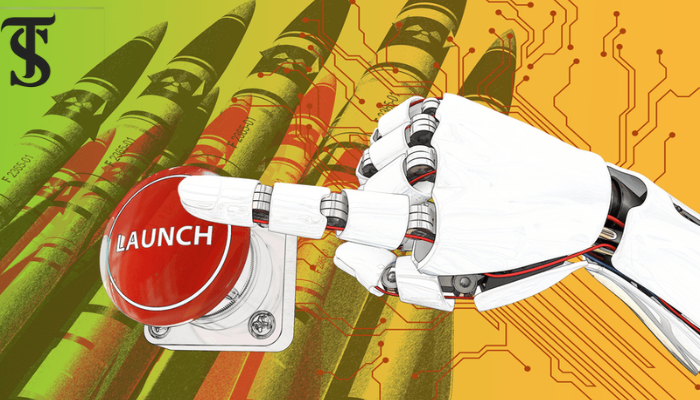AI in Pakistan’s Education: Challenges and Opportunities

- Emerging Integration of AI in Education: Initiatives like DigiSkills and collaborations with platforms such as Khan Academy highlight Pakistan's gradual adoption of AI for skill development and modernized learning, especially post-COVID-19.
- Challenges in AI Implementation: Issues like infrastructure deficits, resistance to change, ethical concerns, and policy gaps hinder the full-scale adoption of AI in Pakistan's education sector.
- Future Potential and Recommendations: AI offers opportunities for personalized learning, teacher empowerment, and bridging urban-rural divides, provided the government invests in infrastructure, teacher training, and ethical policy frameworks.
Artificial Intelligence is changing the education sector globally, providing ways that make learning easy to access. Most Asian countries, like China, Japan, and Singapore, incorporated AI in education sectors, showing its ability to customize learning and address current challenges. Meanwhile, education in Pakistan is still facing major challenges like poor infrastructure and socio-economic and policy strategy, which highlights the need to explore the potential of AI. This article examines the potential of AI to revolutionize Pakistan’s education system, existing challenges, and the position of AI in the coming years.
The Role of AI in Pakistan’s Education Sector
Emerging Trend
AI is taking a position in Pakistan’s education through online learning platforms and AI tools. Initiatives like DigiSkills and Khan Academy are teaching people with digital skills, and institutions like NUST and UET Lahore are offering different ranges of digital courses at different stages (Ahmad et al., 2021). These programs are designed to prepare students for the digital world and allow them to learn modern skills for survival in today’s job market.
COVID-19 as a Catalyst
The COVID-19 pandemic pushed AI into the spotlight in education. For instance, The City School teamed up with AI platforms like Century to keep learning going during lockdowns. This situation showed how helpful AI can be in tackling challenges like limited physical access to education. The tools offered instant feedback and tailored learning experiences, which boosted both student performance and teaching effectiveness.
Global Collaborations
In Pakistan, universities are stepping up their game by collaborating internationally to enhance AI applications. NUST, for example, collaborated with Google to develop AI for flood forecasting, while UET Lahore worked with IBM on cybersecurity initiatives. These partnerships really emphasize the value of using global expertise to solve local challenges.
Challenges to AI Integration
The incorporation of AI in the educational sector of Pakistan holds considerable promise; however, it encounters substantial challenges.
Infrastructure Deficiencies
The educational framework in Pakistan is not equipped with the tech essentials to fully integrate AI. With internet access being limited and electricity often unreliable in rural areas, the digital divide just keeps growing (Khurshid et al., 2024).
Ethical and Privacy Concerns
With AI’s capability to handle massive amounts of data, there are some privacy and security red flags. Students and teachers are sharing their concerns about the risk of data being misused and the possible loss of their decision-making independence.
Resistance to Change
The pushback against AI and the anxiety over job losses are making it tough for schools to embrace this technology. Some critics believe that depending too much on AI could dull students’ critical thinking and creativity, while others are concerned that automation might take away jobs from traditional teachers.
Policy & Strategy Gaps
The lack of unified national policies and strategies for AI in education leads to a lot of uncertainty. When the government does not take the lead, private sector initiatives end up being scattered and not very impactful.
The Future of AI in Pakistan’s Education
Personalized Learning
AI has the power to create personalized learning experiences, which could really help tackle the low literacy rates in Pakistan and close the learning gaps. By pinpointing each student’s unique needs, AI can offer customized lessons that boost understanding.
Teacher Empowerment
AI has the potential to back up traditional teaching by handling administrative work and giving insights based on student performance data. This means teachers can spend more time on actual teaching and work on making their lessons even better (Murtaza & Hui, 2021).
Bridging Urban-Rural Divides
With AI-powered digital classrooms, quality education can reach even the most remote areas, overcoming geographical limits. Adaptive learning platforms can offer lessons in local languages, making it easier for everyone to access education.
Promoting Ethical AI Usage
For AI to be integrated sustainably, universities need to focus on teaching the ethical use of AI tools (Salman et al., 2024). This way, they can create a culture where both students and educators adopt technology responsibly.
Policy Recommendations
For Pakistan to harness the full potential of AI, a diverse strategy is key:
Infrastructure Investment: Enhance internet connectivity and equip schools with essential digital resources.
Training Initiatives: Educate teachers and students on effectively using AI technologies.
Collaborative Efforts: Promote partnerships among government agencies, educational institutions, and tech firms.
Policy Framework: Establish comprehensive guidelines that cover privacy, security, and ethical issues in AI.
Conclusion
AI has a huge potential to change the education scene in Pakistan, improving learning results and making education more accessible. Even though there are hurdles like poor infrastructure and cultural pushback, with the right investments and policies, we can successfully bring AI into the mix. By encouraging partnerships and tackling ethical issues, Pakistan can tap into AI’s capabilities to transform its education system and equip students for a competitive world. The future of AI in education isn’t just about tech; it’s about ensuring everyone has a fair shot at learning.
Alina Gulzar
The author holds an M.Phil. in English and works as a lecturer and freelance writer, specializing in research and content writing.





